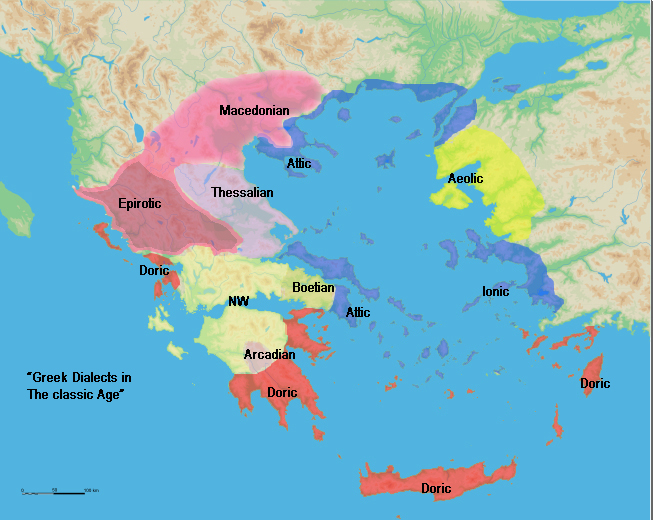   AtticGreekLanguage AtticGreekLanguage
|

|
Sigma KEE - AtticGreekLanguage

|
|
Relationships
|
|
|
|
| Parents |
GreekGroupLanguage |
A GreekGroupLanguage is any of seven closely related IndoEuropeanLanguages spoken in Greece and nearby regions.(extract from http://www.ethnologue.com/)
|
| Instances | AncientGreekLanguage | The AncientGreekLanguage is an AtticGreekLanguage of Greece. SIL code: GKO. ISO 639-2: grc. Dialects: KOINE GREEK, CLASSICAL GREEK. Comments: Koine Greek is used as a religious language by the Greek Orthodox Church. The language of the text of the Christian New Testament. Extinct. Bible c. 42-98 A.D.(extract from http://www.ethnologue.com/) |
| | CappadocianGreekLanguage | The CappadocianGreekLanguage is an AtticGreekLanguage of Greece. SIL code: CPG. ISO 639-2: ine. Region: Resettled to various locations in Greece in 1922. Formerly in central Turkey (Cappadocia). Sille was in Sille town near Konya, Western Cappadocian was in villages south of Kayseri, Pharasa was in Pharasa (Faras) and surrounding villages. Dialects: SILLE, WESTERN CAPPADOCIAN, PHARASA. Comments: Closest to Pontic. Even more distinct from Standard Greek than Pontic is. Language was under extensive attrition from Turkish at the time of the population exchanges in 1922, and has now died out since the 1960s under pressure from Standard Greek (N. Nicholas 1997, Costakis). Different from the ancient Anatolian language spoken in Cappadocia. Dictionary. Christian. Extinct.(extract from http://www.ethnologue.com/) |
| | GreekLanguage | An Indo-European language that is spoken in Greece. |
| | PonticGreekLanguage | The PonticGreekLanguage is an AtticGreekLanguage of Greece. SIL code: PNT. ISO 639-2: ine. Population: 200,000 in Greece (1993 Johnstone). Population total all countries: 320,000 or more. Region: The majority of speakers live in Salonica, borough of Kalamaria, and the rest of Macedonia in Greece. There may still be speakers on the Black Sea coast of Turkey. Also spoken in Azerbaijan, Canada, Georgia, Kazakhstan, USA. Alternate names: PONTIC GREEK. Comments: Speakers of Standard Greek cannot understand Pontic, and Pontic speakers are reported to not understand or speak Standard Greek. Pontic clubs and centers exist in the Athens_Peiraeus suburbs. Young people may speak Standard Greek as their first language. Speakers in North America are reported to hold onto their language more zealously than those in Greece. Ethnic Greeks in Georgia called 'Rumka' speak Pontic Greek. Brought to Greece in the 1920s and 1930s by immigrants from the Black Sea coast, which had been inhabited by Greeks since antiquity.(extract from http://www.ethnologue.com/) |
| | RomanoGreekLanguage | The RomanoGreekLanguage is an AtticGreekLanguage of Greece. SIL code: RGE. ISO 639-2: ine. Population: No estimate available. Alternate names: HELLENOROMANI. Comments: Structured on Greek with heavy Romani lexicon.(extract from http://www.ethnologue.com/) |
| | YevanicGreekLanguage | The YevanicGreekLanguage is an AtticGreekLanguage of Israel. SIL code: YEJ. ISO 639-2: ine. Population: 35 possibly in Israel. There were a few semi_speakers left in 1987, and may be none now. Population total both countries 50 or fewer. Region: There may be a handful of elderly speakers still in Turkey. Also spoken in USA. Alternate names: JUDEO_GREEK, YEVANITIKA. Comments: Jews gave it up in Rome by 4th century, Spain by 6-7th centuries, Crimea by 8th century. After 1000 A.D. almost entirely in Greece, some in the Balkans (Wexler 1985). Jewish. Nearly extinct.(extract from http://www.ethnologue.com/) |
 |
Show full definition (without tree view)
Show full definition (with tree view)
|